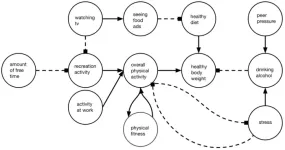(Press-News.org) EAST LANSING, Mich. – Providing safe drinking water was a great public health achievement in the 20th century, yet problems persist. According to the Centers for Disease Control and Prevention, about 7.15 million waterborne illnesses occur in the United States annually resulting in 601,000 emergency room visits, 6,630 deaths and $3.33 billion in direct health care costs. Michigan State University, a world leader in water research, is working to make our drinking water safer.
MSU has been awarded a $2.1 million grant from the U.S. Environmental Protection Agency, or EPA, to better understand the amount of pathogens, such as Legionella, and disinfection byproducts in drinking water distribution systems and to assess associated health risks. MSU also will develop a systematic way to monitor water systems.
“It may be hard to believe, but there are no common systematic ways to assess the safe levels of opportunistic pathogens like Legionella in our drinking water — not in the U.S. or anywhere else in the world,” said Jade Mitchell, principal investigator and associate professor in the Department of Biosystems and Agricultural Engineering in MSU’s College of Agriculture and Natural Resources and College of Engineering. “These pathogens can grow in drinking water systems as a result of aging infrastructure and private or unregulated water systems. We are working to create a much-needed assessment system.”
Mitchell said even though disinfectants are used in water systems to control pathogens, these can cause additional problems by reacting with natural organic matter, bromide and other contaminants to form disinfectant byproducts, or DBPs, which also have the potential to be harmful to human health. While some DBPs are regulated by the U.S. EPA, other toxic compounds may still occur and persist.
“We think we are making water safe with disinfectants, but we really don’t know,” Mitchell said. “The human health risks trade-offs between opportunitstic pathogens and unregulated DBPs need to be assessed and dealt with.”
The EPA said this research will improve our understanding of how to control contaminants and help inform water infrastructure management and risk-mitigation practices to ensure cleaner drinking water for all Americans.
The MSU project team, led by Mitchell, also partners with Ohio State University, Clemson University, Tulane University, the College of New Jersey, Drexel University, Garver Inc. and the New York State Department of Health. In addition to MSU, other institutions received similar grants, including the University of Minnesota, University of Texas at Austin and Georgia Tech Research Corporation.
###
Michigan State University has been advancing the common good with uncommon will for more than 165 years. One of the world's leading research universities, MSU pushes the boundaries of discovery to make a better, safer, healthier world for all while providing life-changing opportunities to a diverse and inclusive academic community through more than 400 programs of study in 17 degree-granting colleges.
For MSU news on the Web, go to MSUToday. Follow MSU News on Twitter at twitter.com/MSUnews.
END
MSU works to make drinking water safer by fighting contaminants
2023-09-27
ELSE PRESS RELEASES FROM THIS DATE:
Want to make better decisions? Ask for less information, not more
2023-09-27
When people have to make a tough decision, their first instinct is usually to gather as much information as possible. Just one problem: according to research published this week in Cognitive Research: Principles and Implications, most people’s decision-making actually gets worse, not better, when you give them additional facts and details.
“It’s counterintuitive, because we all like to think we use information wisely to make smart decisions,” said Farber Chair Associate Professor ...
HMS researcher to lead $104 million federal project tackling antibiotic resistance
2023-09-27
At a glance:
Johan Paulsson, HMS professor of systems biology, will lead project studying bacterial behavior and antibiotic resistance.
Efforts will focus on developing technology to improve diagnosis, speed discovery of new antibiotics, and illuminate basic mechanisms of bacterial behavior.
Harvard Medical School researcher Johan Paulsson will lead a multi-institutional $104 million effort to study bacteria and antibiotic resistance, the U.S. Department of Health and Human Services announced today.
The work is funded by the newly established Advanced Research Projects Agency for Health (ARPA-H) in an ...
Study provides new look at why rare cancer often evades treatments
2023-09-27
BOSTON - Researchers at Boston Medical Center and Dana-Farber Cancer Institute conducted one of the first-ever analyses of neuroendocrine tumors (NETs) at single cell resolution, unlocking new insights into this rare and often hard-to-treat cancer. The findings represent a tremendous leap forward in understanding why these tumors are largely resistant to immunotherapy and provide key insights that could lead to future treatments.
“This study was a tour-de-force that catalyzed the efforts and innovations of researchers across Boston – including Boston Medical Center and Dana-Farber Cancer Institute - and has resulted in a better understanding ...
Opportunities to improve lung cancer care for older patients
2023-09-27
“With the majority of lung cancer patients being older than 65, it is imperative that actions are taken to encourage and facilitate clinical trials among older patients.”
BUFFALO, NY- September 27, 2023 – A new editorial paper was published in Aging (listed by MEDLINE/PubMed as "Aging (Albany NY)" and "Aging-US" by Web of Science) Volume 15, Issue 17, entitled, “Promising trends in lung cancer care, but are we overlooking the majority?”
In their new editorial, ...
Reassessing COVID-19 precautions in 2023
2023-09-27
“The balance between appropriate precautions and the harm of social isolation always requires a thorough appraisal.”
BUFFALO, NY- September 27, 2023 – A new editorial paper was published in Oncotarget's Volume 14 on September 22, 2023, entitled, “Reassessing the risks and benefits of COVID-19 precautions in 2023.”
The COVID-19 pandemic has killed over one million Americans with many dying during the Omicron wave. By now most Americans have either had COVID-19 and/or been vaccinated against it. Despite the availability of updated immunizations, only 16.7% of Americans are now up-to-date on bivalent ...
Is a longer reproductive lifespan good for your brain?
2023-09-27
EMBARGOED FOR RELEASE UNTIL 4 P.M. ET, WEDNESDAY, SEPTEMBER 27, 2023
MINNEAPOLIS – People with a higher cumulative estrogen exposure throughout their life may have a lower risk of cerebral small vessel disease, according to a new study published in the September 27, 2023, online issue of Neurology®, the medical journal of the American Academy of Neurology.
Cerebral small vessel disease, a form of cerebrovascular disease, results from damage to small blood vessels in the brain. It raises the risk of cognitive impairment and dementia.
“Previous research has shown that rates of cerebrovascular disease increase after menopause, which is often attributed ...
Exposure to air pollution linked to increased risk of stroke within 5 days
2023-09-27
EMBARGOED FOR RELEASE UNTIL 4 P.M. ET, WEDNESDAY, SEPTEMBER 27, 2023
MINNEAPOLIS – Short-term exposure to air pollution may be linked to an increased risk of stroke, according to a meta-analysis published in the September 27, 2023, online issue of Neurology®, the medical journal of the American Academy of Neurology. Short-term exposure was defined as occurring within five days of the stroke.
“Previous research has established a connection between long-term exposure to air pollution and an increased risk of stroke,” said study author Ahmad Toubasi, MD, of the University of Jordan in Amman. “However, the correlation between short-term ...
Microplastics are found in cave water and sediment, says SLU research
2023-09-27
In two recent papers, Saint Louis University researchers report finding high concentrations of microplastics present in a Missouri cave system that had been closed to human visitors for 30 years.
Elizabeth Hasenmueller, Ph.D., associate professor of Earth and Atmospheric Sciences and associate director of the WATER Institute at SLU, and her team published findings in the journals, Science of the Total Environment and Water Research, finding significant microplastic levels in Cliff Cave in Saint Louis County, Missouri.
The research, which originated from Hasenmueller’s research group and Karst Hydrology class, allowed students on the ...
Genetic variation with MASLD reveals subtypes and potential therapeutic avenues
2023-09-27
An astounding 30% of Americans currently have metabolic dysfunction-associated steatotic liver disease, or MASLD, which is formerly known as nonalcoholic fatty liver disease, or NAFLD.
And many are unaware that they have it.
Over time, MASLD can lead to cirrhosis, liver failure and even liver cancer. The disease is also associated with and might be caused by factors that contribute to obesity, diabetes, high cholesterol and heart disease.
“Many people are not aware that MASLD can also be a sign of another condition, like diabetes or cardiovascular disease,” said Elizabeth Speliotes, M.D., Ph.D., M.P.H., gastroenterologist at Michigan Medicine ...
Expert: The current pace of decarbonization in Massachusetts is too low to meet climate goals
2023-09-27
Media contacts:
Emily Gowdey-Backus, director of media relations, Emily_GowdeyBackus@uml.edu
Nancy Cicco, assistant director of media relations, Nancy_Cicco@uml.edu
Having worked with renewables for the last 15 years, and listening to the lofty goals political leaders make to achieve net-zero carbon emissions, UMass Lowell mechanical engineering Professor Christopher Niezrecki can tell you that as a state and a nation, we’re not on track. It’s not easy to wrap one’s head around the scale of the problem and even harder to come up with viable solutions. There is global scientific consensus that ...



